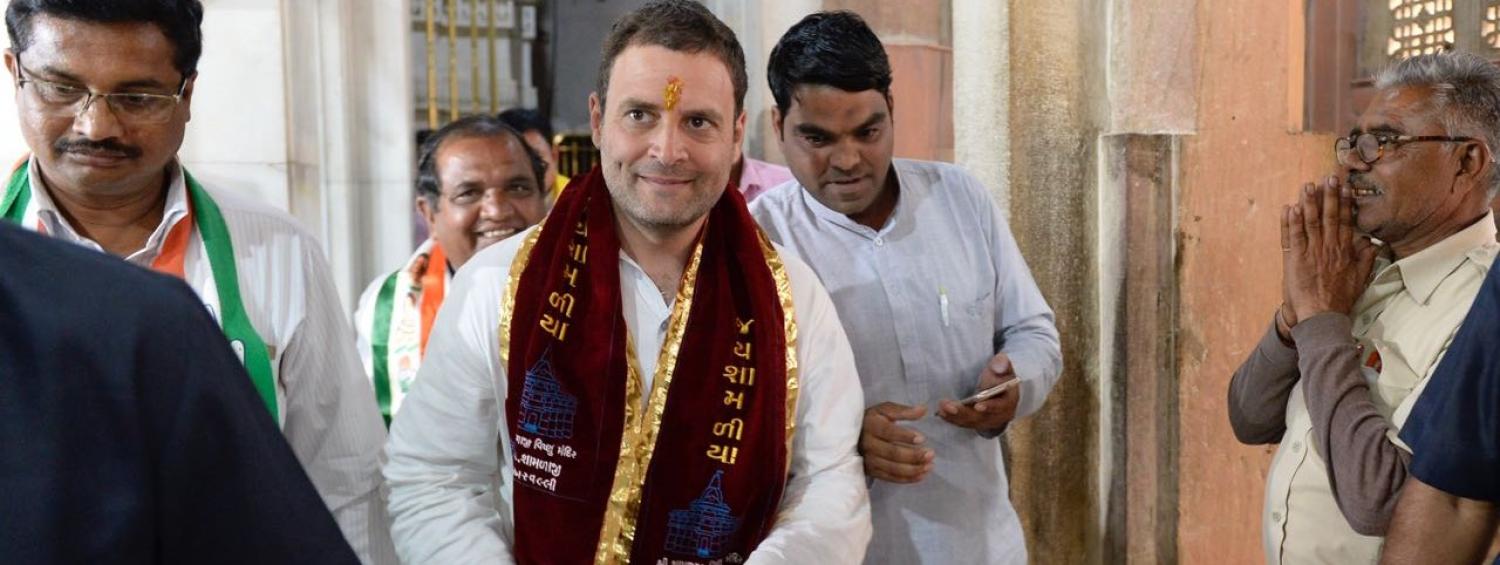Last month's long-awaited ascension of Rahul Gandhi, the scion of India's Nehru–Gandhi political dynasty, to the presidency of the Indian National Congress marks a new era for the party. Often derided for his lack of charisma and apparent reluctance to assume the mantle of leadership, Gandhi was an unexpectedly strong campaigner in his first test as leader during the Gujarat state election campaign. This performance has given hope to his party which is at its lowest-ever point after losing a series of state elections.
These subnational elections have been given a new national importance under the Narendra Modi–led Bharatiya Janata Party (BJP) due to the government's reluctance to declare Chief Ministerial candidates prior to the election, and Modi's extensive involvement in state-level campaigns. Gujarat is a particularly important state to watch in Indian politics because it was the first in which the BJP was able to achieve political dominance. The party has sought to replicate the Gujarat electoral model, built on an aspirational populism pitting Gujarati Hindus against a supposedly corrupt Congress elite that pandered to minorities. Rahul Gandhi's dynastic crowning as Congress President in this context is a liability which Modi tried to capitalise by congratulating the Congress on its 'Aurangzeb Raj (rule)'. Aurangzeb was a Mughal emperor whose name has become, perhaps unfairly, synonymous with brutality and the oppression of Hindus.
In his campaigning for the election in Gujarat, Gandhi sought to counter this narrative and take advantage of growing tensions in the state. High rates of economic growth in Gujarat have not translated into growing job opportunities or a decline in inequality. Polarisation between Hindus and Muslims, and the marginalisation of Dalits (a traditionally oppressed social group) in the state is acute. Gandhi's speeches on the campaign trail attacked the BJP's economic and social record within a larger narrative that painted it as a party of anger and hate, led by bullies and taking India back to a 'medieval past'. The Congress in this narrative was the underdog – a party of love, dialogue and inclusiveness which stood up to bullies and defended free speech.
Gandhi's Congress also formed alliances with young Gujarati leaders who have mobilised disaffected youth around issues of unemployment, the lack of educational opportunities, and Hindu nationalist violence against minorities. This was quite a feat given that these leaders (Alpesh Thakor, Jignesh Mevani and Hardik Patel) are from different communities with distinct interests and are not natural allies.
But none of this was quite enough. The BJP won its sixth consecutive election in Gujarat, albeit with a reduced number of seats and with the Congress increasing its share of seats and votes. Despite genuine discontent with the BJP in Gujarat, the majority of voters have stuck with the party and its promises of transformation and aspiration. A post-poll survey suggests that late deciders swung the election; perhaps the result of aggressive late campaigning in the state by Modi, who continues to be enormously popular.
National surveys paint a similar picture. GDP and jobs growth have both slowed. The impact of the BJP's controversial demonetisation policy and the introduction of the goods and services tax has been largely negative for workers in the rural economy, the informal sector, and small-scale industries in which most Indians are employed. The majority were of the opinion that Modi should have condemned the mob lynchings of Muslims accused of eating beef by Hindu nationalist activists. Still, Modi remains overwhelmingly the preferred prime minister over Gandhi.
This doesn't bode well for the Congress's electoral prospects in the fast-approaching 2019 national election. Recent research has shown that the BJP's ability to attract 'vote mobilisers' – non-partisan individuals who campaign and canvas for the party at a grass-roots level – has been key to its electoral successes. These vote mobilisers seem to be particularly attracted to leaders who appear to be transformational, such as Modi. In this light, Gandhi's new underdog narrative preaching a politics of love and inclusiveness is unlikely to lead to national electoral success.
The Congress's Gujarat strategy of aligning the party with young charismatic leaders outside the party, however, may provide it with a way forward. Both Thakor and Mevani won the seats they contested against BJP candidates, and Patel's campaigning helped the Congress vote. But crafting a transformational narrative that places these leaders, rather than Rahul Gandhi, at the forefront will be essential. The Congress initially gained its dominance in Indian politics by building a decentralised structure of strong state party units that was genuinely inclusive of diverse interests at a grass-roots level. It is this Congress legacy, rather than the Nehru–Gandhi dynasty, that the party should aim to restore.

